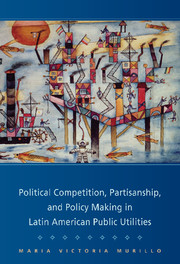Book contents
- Frontmatter
- Contents
- List of Acronyms
- Acknowledgments
- Introduction
- 1 Voice and Light
- 2 Political Competition and Policy Adoption
- 3 Casting a Partisan Light on Regulatory Choices
- 4 Postreform Regulatory Redistribution in Chile
- 5 Postreform Regulatory Redistribution in Argentina and Mexico
- 6 A Multilevel Analysis of Market Reforms in Latin American Public Utilities
- 7 Conclusion
- References
- Index
- Titles in the series
3 - Casting a Partisan Light on Regulatory Choices
Published online by Cambridge University Press: 05 June 2012
- Frontmatter
- Contents
- List of Acronyms
- Acknowledgments
- Introduction
- 1 Voice and Light
- 2 Political Competition and Policy Adoption
- 3 Casting a Partisan Light on Regulatory Choices
- 4 Postreform Regulatory Redistribution in Chile
- 5 Postreform Regulatory Redistribution in Argentina and Mexico
- 6 A Multilevel Analysis of Market Reforms in Latin American Public Utilities
- 7 Conclusion
- References
- Index
- Titles in the series
Summary
This chapter shows how the content of market reforms in public utilities varies depending on who adopts these policies. Reformers can be either right-wing governments of true believers in the market as the best way of allocating resources or populists who pragmatically converted to the market creed under financial pressure. Which sort of politicians implement privatization reforms has a crucial effect on policy content due to their different constituencies, prior beliefs about state intervention, and allied experts. These factors reinforce each other in producing different preferences for the ideal degree of government control of private investors and for the distributive effects expected from privatization. As a result, the regulatory content of reforms generates different beneficiaries and institutional choices depending on the partisan identity of the reformers. When right-wing true believers are in charge, we should expect reforms to be market-conforming, and when pragmatic populist converts adopt reforms, we should expect them to be market-controlling. This partisan variation in policy content has been ignored by most studies of market reforms in Latin America due to the less publicly salient character of this dimension of policy making as compared with initial policy adoption.
Partisanship: Constituencies, Ideas, and Experts
Partisan preferences about policy content are based on constituencies, ideological legacies, and allied technocrats. Partisan constituencies generate distributive demands, ideological legacies provide a lens with which to interpret the distributive consequences of policy choices under new circumstances, and politicians' linkages to allied technocrats define to whom they will delegate technically complex choices based on a shared understanding of distributive goals.
- Type
- Chapter
- Information
- Political Competition, Partisanship, and Policy Making in Latin American Public Utilities , pp. 99 - 144Publisher: Cambridge University PressPrint publication year: 2009

